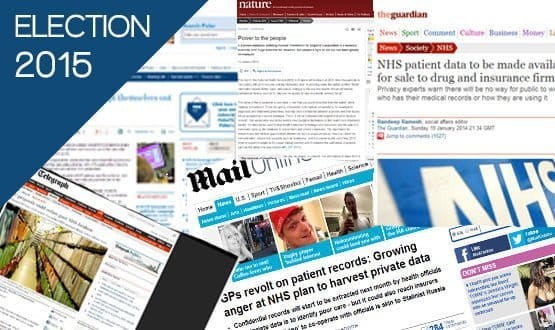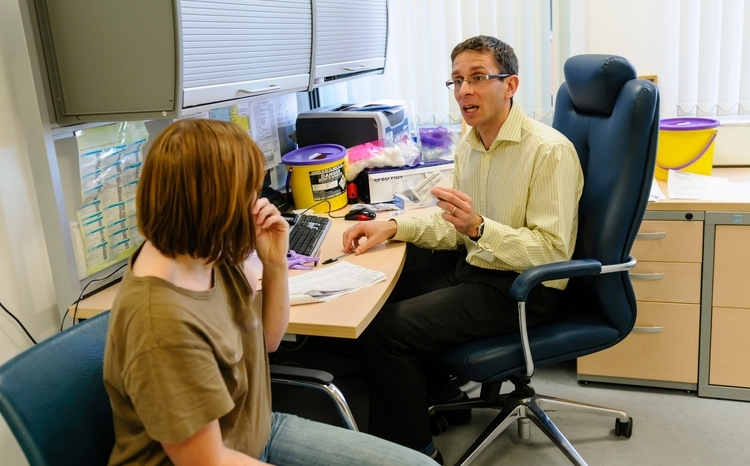Care.data stuck in the last chance saloon
- 9 April 2015

Of all the major health IT initiatives to be launched during the coalition government’s term in power, the care.data programme has been notable by its absence from electioneering.
Health secretary Jeremy Hunt has been quick to highlight the government’s work to improve patient access to online records and move towards a “paperless” NHS at recent health IT conferences, but care.data has had nary a mention.
While this reflects the wide variety of problems that have befallen the programme since work started on it in late 2012, it also raises questions about its future after the general election.
Paved with good intentions
Those behind care.data had lofty goals. Their aim was to create a new, national database of linkable patient data pulled from an expanded set of Hospital Episode Statistics, GPs, social care, community care and other areas.
The idea was to make better use of NHS data to plan services, reduce waste and devise new treatments. Prime Minister David Cameron claimed it would make “every NHS patient a research patient” and hinted it would boost the UK economy.
NHS England said the data would be stored in the ‘safe haven’ of the Health and Social Care Information Centre, where it would be linked to create new Care Episode Statistics.
Phil Booth, co-founder of privacy campaign group medConfidential – one of care.data’s biggest critics – says that while news of the work started to trickle out in 2012, it was some time before the scale of the programme became clear.
“We didn’t have care.data at that point. We knew there was a problem around the section 251s [permissions to use identifiable patient data that had been granted to commissioners before the Health and Social Care Act was passed, but which were stopped by it]. Plainly something was going to happen – but we didn’t know what that was.”
Booth says it was only when NHS England indicated there would be an opt-out from care.data to get around the requirement for patients to consent to the use of their identifiable data that it became clear just what was being planned.
Protecting the patient-GP relationship
When NHS England announced that GP practices would be the first to provide extensive new datasets for care.data in late 2012, medical bodies and privacy experts were quick to express “grave concerns”.
Professor Nigel Mathers, honorary secretary of the Royal College of General Practitioners and a member of the care.data Advisory Group, says the RCGP’s main concern was that the rollout was taking place without making sure that patients fully understood why their data was being shared.
Dr Beth McCarron-Nash, the British Medical Association’s lead for care.data, says the need for clarity was heightened by the “sacrosanct” relationship of openness between a GP and a patient, which could have been threatened by concerns about how the details that patients provided would be used.
“Once you feel that when you go to see your GP your data will be extracted, are you going to tell them everything?”
Booth says there were also concerns that the data gathered would be sold to commercial organisations such as insurers. He describes this as an “extremely toxic” scenario – and it was one that didn’t get any less toxic when it emerged that the Hospital Episode Statistics had been used in ways the proponents of care.data tried to claim could never happen.
While the government has since amended the Health and Social Care Act to limit access to organisations dealing with “the provision of health and social care or the promotion of health”, McCarron-Nash feels the changes still provide loopholes for companies to exploit.
Between a rock and a hard place
GPs’ ability to dissent over care.data has been hampered by the government’s Health and Social Care Act. While it tightened up a lot of the rules around NHS data use, it also introduced a new, legal requirement to provide data requested by the Health and Social Care Information Centre.
However, as McCarron-Nash points out, GPs retained their obligations as data controllers to make sure that patients understand what was happening to their information and any opt-out process – placing them in an unenviable position.
“They’re in a difficult position, because they are responsible for ensuring data security, but [care.data] is mandated by law so they have no choice [but to comply with it]. A lot of GPs felt extremely angry.”
Despite these concerns, the scheme was approved by the General Practice Extraction Service Independent Advisory Group in March 2013.
However, the controversy had reached such a pitch that extractions at pilot practices were put on hold until March 2014. NHS England trumpeted that it was planning a £1 million leaflet drop across 22 million households in the meantime, as part of a £2 million campaign to make people aware of the scheme.
A publicity palaver
Unfortunately for care.data’s fans, the leaflet turned into a PR nightmare. Many people complained they found it tucked inside junk mail or failed to receive it at all, while privacy campaigners slammed the flyer for failing to mention the programme by name or include an opt-out form.
McCarron-Nash describes the publicity campaign as “a shambles”. “When people got the leaflets, the vast majority a) couldn’t recall receiving one and b) if they did, they didn’t understand it. I follow care.data and I couldn’t bloody understand it!”
Booth says NHS England failed to take heed of criticism. “They did not think it through properly, they did not consult enough, and when they did, they ignored the advice they got. Anyone who saw that leaflet knew instantly there were going to be problems.”
These problems, combined with the BMA expressing concerns and the RCGP warning of a “crisis of public confidence”, led to the February 2014 announcement of yet another delay, this time until an unspecified date in autumn while NHS England worked to build public confidence in the scheme.
Facing the music
Since then, the organisation has held a series of public meetings and stakeholder consultations in an attempt to understand people’s concerns and take them seriously – an effort which Mathers praises.
“I think they’ve done their best. I don’t think it’s perfect, but it’s as much as they reasonably could have been expected to do – in fact, beyond what they could have been expected to do.”
Come the stated autumn deadline – October 2014, to be specific – this work resulted in tangible progress when NHS England announced that clinical commissioning groups in four areas had been chosen as pathfinders to test different communication strategies with patients, explaining the benefits and risks of data sharing, before moving forward with data extractions.
However, any momentum gained from the announcement was stunted by last December’s report from Dame Fiona Caldicott and her Independent Information Governance Oversight Panel. This outlined 27 “unresolved” questions that must be answered before care.data can proceed.
With NHS England still in the process of responding to the review, and Kelsey confirming that no extractions will take place until after the election on 7 May, the care.data programme is far behind where its creators would have hoped.
Mixed messages
Indeed, it looks stalled. Kelsey was irked by EHI News’ headline on the story saying extractions were on hold, since it implied the whole programme was on hold.
He insisted extractions "were never going to happen before May", but said that communications would still be sent out before the election to provide the panel with more information about patients' understanding of the project.
But just over a fortnight later, The Register raised concerns about “sneaky plans” to move ahead with communications. In response, an NHS England spokesperson told EHI News patients would not receive any letters or other materials about care.data until after polling day – claiming that had “always been the case”.
Mathers believes the passion of those behind care.data is partly responsible for the issues that have waylaid it.
“I think they got so close to the project, they forgot about the wider world outside. In my personal opinion, they focussed too much on the technical aspects and forgot about the human aspect.”
This view is backed by McCarron-Nash, who says the government’s drive towards greater transparency in healthcare has also tilted the scales.
“Jeremy Hunt has been clear that he is driven by a transparency agenda. When you’re that enthusiastic about something, it’s easy to lose sight of the major concerns that need to be addressed regarding privacy.”
Facing the end, or a re-birth?
So where, then, does this leave care.data? All those who spoke to EHI News say care.data, or at least the idea of expanding how data is used beyond healthcare, will be back on the agenda after the election.
Mathers describes care.data as “in principle… a very powerful tool to improve the care of patients and encourage high-quality research”, while Booth also acknowledges its potential to improve public health and research.
However, Booth says there are a number of outstanding issues that must be addressed before the scheme can move ahead, including the development of a technical solution to the opt-out process by the HSCIC.
Mathers is in favour of a “re-launch” of care.data by the incoming government, outlining the work that has been done in the last year to address concerns and re-stating the case for the use of patient data.
But with the Conservatives quiet and Labour more inclined to push old fashioned access to GP surgeries in its campaigning, there must be questions about how quickly or enthusiastically any new government would do this.
Having described care.data as being in “last chance saloon” earlier in the year, Mathers is very clear about the high stakes facing the programme.
“I think it could be an incredibly powerful and useful tool for improving patient care, and it would be a real tragedy if we lost that because the rollout was mishandled.”




